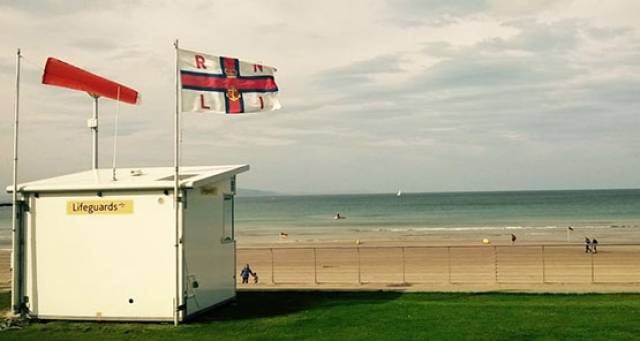An off-duty RNLI lifeguard has rescued a teenage boy this afternoon after he got into difficulty when bodyboarding in Portrush.
Conard McCullagh, a Senior RNLI Lifeguard on the Causeway Coast was cycling from Portstewart where he had been attending the North West 200 race paddock when at approximately 2pm he observed two teenagers on bodyboards in the water at Portrush West Strand.
Knowing the beach and the dangers of the water at Black Rocks, an area prone to rip currents, Conrad immediately sensed that the teenagers may get into difficulty and went to their parents who were on the shore. Conrad felt the teenagers were too far out in the water and advised their parents to wave them back in.
One of the teenagers, a 15-year-old girl managed to paddle her way in but the 13-year old boy struggled and indicated that he couldn’t get back in as the water was sucking him out fast.
Conrad immediately ran to the RNLI Beach Lifeguard Unit and grabbed a rescue board and went to the casualty and pulled him out of the water.
Once he had the teenage boy safely ashore, Conrad carried out casualty care checks to ensure the boy was ok.
Speaking following the rescue, Karl O’Neill, RNLI Lifeguard Supervisor said: ‘I would like to commend Conrad who wasn’t on duty this afternoon but used his RNLI skills and training to remain vigilant, spot the danger and go straight to the family when he suspected the teenagers may be in trouble.
‘This rescue serves as a reminder to us all that while we may be experiencing some good weather we still need to respect the water. It is a sunny warm day and the water appears calm and everything looks good on the surface but the reality is there is a lot going on underneath and the water can be very dangerous. The current the boy was bodyboarding in was simply too strong to paddle against. Thankfully, Conrad was able to go to the boy’s assistance today and we would like to wish him well following what must have been a frightening experience for him.’
RNLI lifeguards are on patrol from 11am-7pm at weekends on Benone Strand, Portrush West and East Strands, Whiterocks and Portstewart. They will take up full time daily patrol for the Summer on Saturday 25 June.
The RNLI’s advice for anyone planning a trip to the beach is to respect the water, check weather and tide times before you go and if planning to go into the water, swim at a lifeguarded beach, between the red and yellow flags. Avoid using inflatables in strong winds or rough seas.
If you get into trouble, stick your hand in the air and shout for help and if you see someone else in trouble, tell a lifeguard. If you can’t see a lifeguard, call 909 or 112 and ask for the Coastguard.






























































